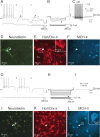The wake-promoting hypocretin-orexin neurons are in an intrinsic state of membrane depolarization
- PMID: 12629156
- PMCID: PMC6741978
- DOI: 10.1523/JNEUROSCI.23-05-01557.2003
The wake-promoting hypocretin-orexin neurons are in an intrinsic state of membrane depolarization
Abstract
Wakefulness depends on the activity of hypocretin-orexin neurons because their lesion results in narcolepsy. How these neurons maintain their activity to promote wakefulness is not known. Here, by recording for the first time from hypocretin-orexin neurons and comparing their properties with those of neurons expressing melanin-concentrating hormone, we show that hypocretin-orexin neurons are in an intrinsic state of membrane depolarization that promotes their spontaneous activity. We propose that wakefulness and associated energy expenditure thus depend on that property, which allows the hypocretin-orexin neurons to maintain a tonic excitatory influence on the central arousal and peripheral sympathetic systems.
Figures



References
-
- Antunes VR, Brailoiu GC, Kwok EH, Scruggs P, Dun NJ. Orexins/hypocretins excite rat sympathetic preganglionic neurons in vivo and in vitro. Am J Physiol Regul Integr Comp Physiol. 2001;281:R1801–R1807. - PubMed
-
- Bayer L, Eggermann E, Serafin M, Saint-Mleux B, Machard D, Jones BE, Mühlethaler M. Orexins (hypocretins) directly excite tuberomammillary neurons. Eur J Neurosci. 2001;14:1571–1575. - PubMed
-
- Bittencourt JC, Presse F, Arias C, Peto C, Vaughan J, Nahon JL, Vale W, Sawchenko PE. The melanin-concentrating hormone system of the rat brain: an immuno- and hybridization histochemical characterization. J Comp Neurol. 1992;319:218–245. - PubMed
Publication types
MeSH terms
Substances
LinkOut - more resources
Full Text Sources
